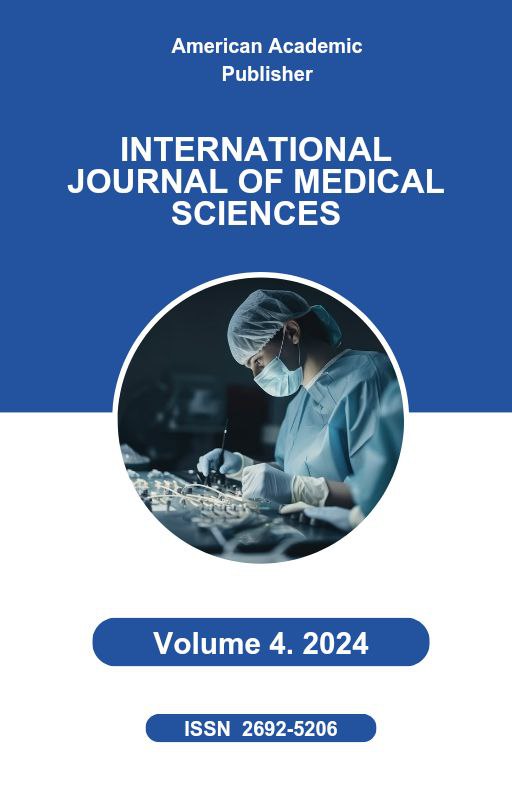 Articles
| Open Access |
https://doi.org/10.55640/
Articles
| Open Access |
https://doi.org/10.55640/
THE ROLE OF CLINICAL CASE-BASED LEARNING IN DEVELOPING DIAGNOSTIC SKILLS OF MEDICAL STUDENTS
ABDURAKHMANOV NIYOZBEK KHAMDAMJON UGLI , assistant of General surgery and ophthalmology department Fergana Medical Institute of Public Health, Fergana, UzbekistanAbstract
This review synthesizes research on technologies like virtual reality, simulation software, and online platforms for developing students' diagnostic competence through clinical cases in medical education, using ophthalmology as an example, to address limitations in traditional teaching methods regarding immersive and scalable learning. The review aimed to evaluate the effectiveness of immersive technologies, benchmark existing platforms, identify features enhancing engagement and reasoning, compare pedagogical outcomes with conventional methods, and analyze integration challenges. A systematic analysis of global studies employing randomized trials, pilot projects, and reviews from diverse geographic contexts was conducted. Findings indicate that virtual reality and simulation significantly improve diagnostic accuracy, clinical reasoning, and surgical skills, with platforms like Eyesi and RetinaVR demonstrating superior outcomes over traditional training. Advanced features such as artificial intelligence and haptic feedback enhance personalized learning but remain underexplored and face implementation barriers. Technology-enhanced methods generally yield higher learner engagement and accessibility, particularly through online and metaverse-based platforms, though they complement rather than replace direct patient interaction. Integration challenges include cost, curriculum alignment, and regulatory concerns.
Keywords
virtual reality (vr), simulation-based learning, diagnostic competence, ophthalmology education, clinical case-based learning, medical education technology
References
Yang T. et al. MetaNODES: A Virtual Reality-Based Approach to Intelligent Neuro-Ophthalmology Education. 2024.
Succar T., Grigg J. A new vision for teaching ophthalmology in the medical curriculum // ASCILITE conference proceedings. 2010.
Gunasekeran D.V. et al. Metaverse and Virtual Health Care in Ophthalmology: Opportunities and Challenges // Asia-Pacific journal of ophthalmology. 2022.
Ong C.W. et al. Applications of Extended Reality in Ophthalmology: Systematic Review. // Journal of Medical Internet Research. 2021.
Iskander M. et al. Virtual Reality and Augmented Reality in Ophthalmology: A Contemporary Prospective. // Asia-Pacific journal of ophthalmology. 2021.
Deuchler S. et al. Simulator-Based Versus Traditional Training of Fundus Biomicroscopy for Medical Students: A Prospective Randomized Trial. // Ophthalmology and therapy. 2024.
Deuchler S. et al. Medical students’ learning experience with the Eyesi slit lamp simulator // Acta ophthalmologica. 2024.
Liu C. et al. Eyesi direct ophthalmoscope simulator: an effective training tool for medical undergraduates // BMC Medical Education. 2024.
Problem-solving in virtual environment simulations prior to direct instruction for differential diagnosis in medical education: An experimental study // MedEdPublish. 2022.
Moon H.S. et al. Usefulness of virtual reality-based training to diagnose strabismus. // Scientific Reports. 2021.
Chan M. et al. Virtual and Augmented Reality Direct Ophthalmoscopy Tool: A Comparison between Interactions Methods. 2021.
Mahmud M.A. et al. The application of augmented reality for improving clinical skills: a scoping review. // Han’gug euihag gyoyug. 2024.
Paik B. et al. Effectiveness of simulation models and digital alternatives in training ophthalmoscopy: A systematic review // Medical Teacher. 2024.
Iqbal A. et al. Immersive Technologies in Healthcare: An In-Depth Exploration of Virtual Reality and Augmented Reality in Enhancing Patient Care, Medical Education, and Training Paradigms // Journal of Primary Care & Community Health. 2024.
Minh T.N. et al. Development and evaluation of virtual reality cases for clinical reasoning training in primary care: A Pilot Study at Hue University of Medicine and Pharmacy // Tạp chí Y Dược học. 2024.
Rao A.N. et al. A Structured Approach to the Development and Evaluation of a Virtual Reality Eye Examination Simulation // International Journal of Human-computer Interaction. 2024.
Bakutkin V., Bakutkin I. A service for teaching medical decision-making using an ophthalmoscopy hardware and software simulator. 2023.
Bakutkin V.V., Бакуткин И.В., Зеленов В.А. Artificial Intelligence in Medical Education Using the Ophthalmological Simulators “Oftalmosim” as an Example // Virtualʹnye tehnologii v medicine. 2024.
Jiang Y. et al. The application of novel techniques in ophthalmology education // Frontiers in Medicine. 2024.
Frisbie J. et al. A Novel Interactive Virtual Medical Student Clinical Rotation for Ophthalmology // Journal of academic ophthalmology. 2022.
Article Statistics
Downloads
Copyright License

This work is licensed under a Creative Commons Attribution 4.0 International License.

